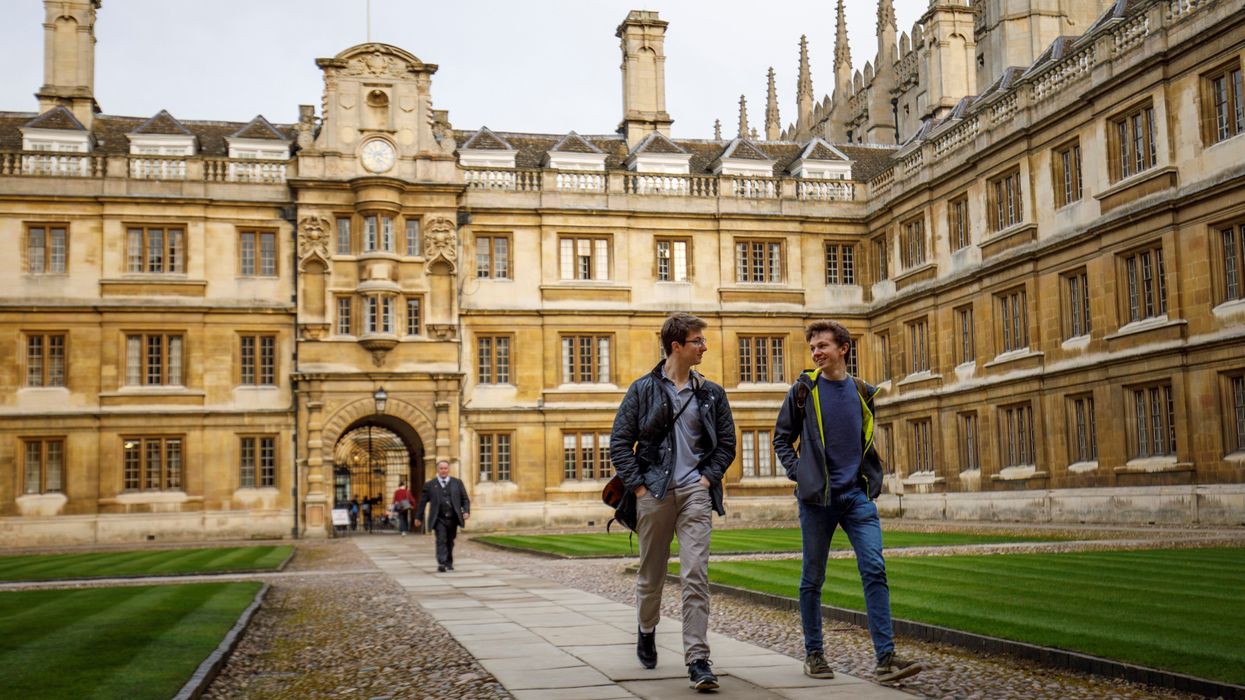Cambridge University students could have classes slashed as they moan over strenuous workload

Students walk through Cambridge University in Cambridge
|GETTY

A teaching review will consider revising the syllabus, introducing grace weeks and bringing in a pilot reading week
Don't Miss
Most Read
Cambridge University has flirted with reducing the workload given to undergraduate students amid growing mental health concerns.
The elite university comissioned a teaching review after its woke student’s union demanded a reading week in the middle of term.
Campaigners cited “mental health problems” associated with “week five blues” as the reason for the proposed change.
Cambridge undergraduates study during three intensive eight-week terms during the academic year.
WATCH NOW: Rob Schneider and John Cleese discuss the impact of 'wokeism'
The University Council agreed to work with Cambridge’s 29 undergraduate-enlisting colleges to “seek to address the issue of excessive workloads”.
The group, which includes the institution’s vice-chancellor, commissioned a review of teaching that will consider options to reduce student workload.
It is considering a syllabus review, grace weeks and a reading week pilot.
The Council stressed it had “serious reservations about the risks of implementing the reading week and of creating inequalities between student groups, as the proposal indicated that it might be necessary to exempt some courses from the reading week”.
It will also consider resources for the university’s supervision system.
LATEST DEVELOPMENTS:
Cambridge University buildings, (front to back) the Grand Courtyard of St John's College, Trinity College, Senate House and the Old Schools, Gonville & Caius College and King's College Chapel
|GETTY
This could see small groups of students meeting up with an academic to deepen their thinking and explore topics further.
Professor Bhaskar Vira, pro-vice-chancellor for education at Cambridge, will lead the teaching review.
Nick Hillman, director of the Higher Education Policy Institute, said: “Our big student academic experience survey does show that student mental health has been getting worse.
“It also shows that students are more demanding about universities responding to that epidemic of mental health problems as well.”
Members of the SU have doubled down on the campaign.

Kings College Chapel, Kings College, Cambridge
|GETTY
Fergus Kirman, the SU’s undergraduate president, said: “Students cannot, and must not, wait another three years for meaningful action.
“Provided everyone involved recognises this, we believe the review of teaching will be a positive, productive avenue.”
Caredig ap Tomos, the SU’s undergraduate participation Officer, also told Varsity: “We recognise that many in the university have challenged the viability of the most recent proposals, but – until they hear a more compelling alternative – this is the change that students want.”
Cambridge University confirmed its review is ongoing and stressed it will continue to consult with undergraduates.

Library at Law faculty, Cambridge University
|GETTY
A spokesman said: “Cambridge’s supervision system remains a distinctive, and valued, element of educational provision and is not under threat.”
“The teaching review is concerned primarily with two areas: student workload (and its impact on mental health and wellbeing), and the future resourcing of supervisions.
“The review is ongoing so it would be wrong to draw any conclusions at such an early stage.
“It’s consulting with student representatives, as well as those from faculties and colleges, and it’s anticipated that an initial set of recommendations will be shared with key stakeholders by the end of June 2024.”










